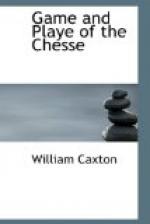the prudence of y’e Iuges/ the auctorite of the
vicaires or legates The c[=o]tynence of the quene/
the c[=o]corde & vnyte of y’e peple Ben not
all thise thinges ascribed vnto the honour and worship
of the kynge Jn his yssue whan he meuyd first The
thirde ligne to fore the peple he neuer excedeth/
Fro in the .iii. nombre alle maner of states begynne
to meue For the trynary nombre conteyneth .iii. parties/
whiche make a perfect nombre/ For a trynarye nombre
hath. i. ii. iii. Whiche Ioyned to geder maken
.vi. Whiche is the first parfyt nombre And signefieth
in this place/ vi. persones named that constitute the
fection of a royame That is to wete the kynge. the
quene. Iuges, knyghtes. the vicaires or legats/
and the comyn peple And therfor the kynge ought to
begynne in his first meuynge of .iii. poyntes/ that
he shewe perfection of lyf as well in hym self as
in other After that the kynge begynneth to meue he
may lede wyth hym the quene/ after the maner of his
yssue For why the quene foloweth vnto two angularye
places/ after the maner of the alphyn/ and to a place
indirect in the maner of a rook in to the black poynt
to fore the phisicien/ herin is signefied that the
women may not meue neyther make vowes of pylgremage
ner of viage wythoute the wylle of theyr husbondes/
For yf a woman had a vowed ony thynge/ her husbonde
lyuynge/ and agaynsaynge/ she may not yelde ne accomplisshe
her vowe/ yf the husbond wyll goo oughwer. he may well
goo wyth oute her And yf so be that the husbond wyll
haue her wyth hym/ she is bounden to folowe hym/ And
by reson For a man is the heed of a woman/ and not
econuerso/ For as to suche thingis as longe to patrymony/
they ben lyke/ but the man hath power ouer her body/
And so hath not the woman ouer his And therfore whan
the kynge begynneth to meue. the Quene may folowe/
And not alleway whan she meuyd it is no nede the kynge
to meue/ For why four the first lignes be with in
the limytes and space of the royame/ And vnto the
thirde poynt the kynge may meue at his first meuynge
out of his propre place/ And whan he passith the fourth
ligne he goeth oute of his royame. And yf he
passe oon poynt late hym beware/ For the persone of
a kynge Is acounted more than a thousand of other/
For whan he exposeth hym vnto the paryllis of bataylle/
Hit is necessarye that he goo temperatly and slyly/
For yf he be taken or ded/ or ellis Inclusid and shette
vp/ Alle the strengthes of alle other faylle and alle
Is fynysshid and loste/ And therfore he hath nede to
goo and meue wysely/ And also therfore he may not
meue but one poynt after hys fyrst meuynge but where
that euer he goo foreward or bacward or on that one
syde or that other or ellis cornerwyse/ He may neuer
approche hys aduersarye the kynge nerrer than in the
thirde poynt/ And therfore the kynges in batayll ought
neuer tapproche one nyghe that other/ And also whan
the kynge hath goon so ferre that alle his men be lost/
than he is sole/ And than he may not endure longe
whan he is brought to y’t extremyte/ And also




